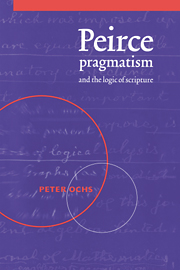8 - Pragmaticism reread: from common-sense to the logic of scripture
Published online by Cambridge University Press: 22 October 2009
Summary
Dear Reader,
In this chapter, I take leave of you as “general reader.” No matter what our specific communities of philosophic inquiry, we should be able to argue, on common terms, about the plain sense of Peirce's pragmaticist writings; through chapter 7, the most general claim I urged on you was that these writings display problems unlike those of Peirce's pragmatic writings. Now, however, I want to offer specific claims about what those problems are and how to solve them, and I do not believe the rules of pragmaticism allow me to urge such claims on you blindly, without considering who you are. I can urge these claims only on those who share in the community of inquiry/conduct out of which I offer the claims. Like you, however, I participate in more than one such community and in communities of varying sizes (and, as I will suggest later, I assume that the size of the community, or its domain, bears a relation to the generality of its claims, or their extension). As a result, I have different kinds of claim to offer, and the different claims will speak to different communities and to more or less inclusive communities.
So, if I address you now as “dear reader,” it is because the way I hope you will read different parts of this chapter depends on who you are. After these introductory remarks, I will review problems in the plain-sense readings of Peirce's pragmaticist writings; this review is addressed to all readers.
- Type
- Chapter
- Information
- Peirce, Pragmatism, and the Logic of Scripture , pp. 246 - 325Publisher: Cambridge University PressPrint publication year: 1998



